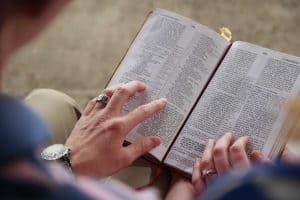Immigration can be a contentious topic these days. If you live in a place immediately impacted by immigration or migration issues, you may already have an opinion. If you’re not directly affected but, as a Christian, you’re trying to make sense of the issue, you can always start with scripture.
What does the Bible say?
The Hebrews Were Migrants
Stories of migration and asylum-seeking appear all over the Old Testament.
The Hebrew people become migrants in the Book of Exodus when they escape from the cruelty of the Egyptian pharaoh. They establish a homeland, only to be conquered by the Babylonians, who scatter the Jewish people throughout the empire during the Exile period of Jewish history.
- Sometimes we ask What is God’s will for my life? when we should really be asking Who should I be?...
- By exploring ten characteristics of who God is―holy, loving, just, good, merciful, gracious,...
The Jewish nation is restored in the Maccabean Revolt, as told in the books of Zechariah and Malachi. A group of Jews successfully overthrows the Jewish oppressors and re-establishes the nation that God has promised them.
The importance of having a safe place to practice one’s beliefs is a common theme throughout most of the Old Testament. So, too, are the struggles and triumphs of individuals and nations who achieve these goals for themselves and help others achieve them.
Jesus Sought Asylum
The Maccabean Revolt ends with relatively powerless Jewish kings managing territory on behalf of the Roman Empire. This tenuous political situation produces the most famous migrants and asylum seekers in the whole Bible – the Holy Family themselves.
The Holy Family’s flight to Egypt is described in Matthew 2:13–23. Jesus, Mary, and Joseph flee to Egypt after Joseph is warned in a dream that Herod, the King of Judea, has ordered the massacre of newborns in an attempt to kill the foretold “King of the Jews.” The Catholic Church even recognizes St. Joseph as the Patron Saint of Immigrants.
To be fair, the Holy Family were not immigrants so much as they were refugees or asylum seekers. They weren’t permanently relocating to Egypt for opportunity, they were moving temporarily to avoid life-threatening political unrest.
Treat Strangers Fairly
The Jewish people and the Holy Family, having spent so much time as migrants themselves, influenced Jewish and Christian religious teachings over millennia, as they relate to how we might view and interact with displaced people.
In the Book of Exodus, God commands the Hebrews,
“You shall not wrong a stranger or oppress him, for you were strangers in the Land of Egypt.”
Exodus 22:21
And again,
“You shall not oppress a stranger; you know the heart of a stranger, for you were strangers in the Land of Egypt.”
Exodus 23:9
Similarly, the Book of Leviticus demands fair treatment of displaced persons under the law, saying,
“You shall have one law for the sojourner and for the native; for I am the Lord your God.”
Leviticus 24:22
We Are Spiritual Migrants
In these cases, the Bible deals with migrants, asylum seekers, and refugees in literal and unambiguous ways. However, some interpretations are more symbolic.
According to one perspective, we may treat all of God’s faithful as migrants, as we all are spiritual people living on Earth for a short time. As the psalmist writes,
“I am a sojourner on Earth; hide not thy commandments from me,”
Psalms 119:19
In his letter to the Hebrews, Paul writes,
“Let Brotherly love continue. Do not neglect to show hospitality to strangers, for thereby some have entertained angels unawares.”
Hebrews 13:12
Maybe physical identifiers like where we are from, where we are, and where we are going aren’t as important. Perhaps the key is how we treat one another as spiritual beings on a faith journey.
How Do You Treat Strangers in this Land?
The Bible was written in a very different time by people living very different lives from our own. It won’t tell you for whom to vote, what party to back, or how to engage in current events.
However, many events recorded in the Bible are not that different from events that affect us today. Conflict and migration existed in the ancient world just as it does now. God told His followers then to treat sojourners fairly, not oppress people seeking better lives, and help people who need it.
Read His Word and ponder it. What do you think God is telling you to do?









![In His Image by Jen Wilkin [Book Review]](https://christpulse.com/wp-content/uploads/2024/10/61MjIOQcqzL._SL1500_-672x1024.jpg)
![The Freedom of Self Forgetfulness by Timothy Keller [Book Review]](https://christpulse.com/wp-content/uploads/2024/10/81d66nQwKTL._SL1500_-e1729059953717-678x1024.jpg)
![The God I Never Knew by Robert Morris [Book Review]](https://christpulse.com/wp-content/uploads/2024/10/71hJU7TtmCL._SL1200_-685x1024.jpg)
![Risen Motherhood: Gospel Hope for Everyday Moments [Book Review]](https://christpulse.com/wp-content/uploads/2024/10/71cpHIjWJ4L._SL1500_-769x1024.jpg)
![The Case For Christianity By C.S.Lewis [Book Review]](https://christpulse.com/wp-content/uploads/2024/04/415022.jpg)






Leave a Comment